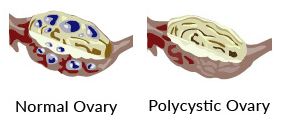What is Polycystic Ovarian Disease (PCOD)?
Polycystic Ovarian Disease (PCOD), also known as Polycystic Ovary syndrome (PCOS) is a very common condition affecting 5% to 10% of women in the age group 12–45 years. It is a problem in which a woman’s hormones are out of balance. It can cause problems with menstrual periods and make it difficult for her to conceive. The principal features include no ovulation, irregular periods, acne and hirsuitism. If not treated it can cause insulin resistant diabetes, obesity and high cholesterol leading to heart disease.

Causes of Polycystic Ovarian Disease (PCOD)
Normally, the ovaries make female sex hormones and a tiny amount of male sex hormones (androgens). These help regulate the normal development of eggs in the ovaries during each menstrual cycle. Polycystic ovary syndrome is related to an imbalance in these sex hormones. In PCOS, they start making slightly more androgens. This causes patients to stop ovulating, get pimples and grow extra facial and body hair.
Follicles are sacs within the ovaries that contain eggs. Normally, one or more eggs are released during each menstrual cycle. This is called ovulation. In polycystic ovary syndrome, the eggs in these follicles do not mature and are not released from the ovaries. Instead, they can form very small cysts in the ovary-.hence the name polycystic ovaries.
PCOS seems to run in families, so the chance of having it is higher if other women in the family have PCOS, irregular periods, or diabetes
1. Raised levels of Testosterone – Androgens or "male hormones," although all women make small amounts of androgens....Higher than normal androgen levels in women can prevent the ovaries from releasing an egg (ovulation) during each menstrual cycle. Excess androgen produced by the theca cells of the ovaries, due either to hyperinsulinemia or increased luteinizing hormone (LH) levels.
2. Raised levels of Luteinising Hormone (LH) – Due to increased production from the anterior pituitary.This stimulates ovulation but may have an abnormal effect on the ovaries if levels are too high.
3. low levels of Sex Hormone-Binding Globulin (SHBG) – A protein in the blood, which binds to testosterone and reduces the effect of testosterone.
4. Raised levels of Prolactin - Hormone that stimulates the breast glands to produce milk in pregnancy.
5. High levels of Insulin (a hormone that helps convert sugars and starches into energy) If you have insulin resistance, your ability to use insulin effectively is impaired, and also your pancreas has to secrete more insulin to make glucose available to cells (so, hyperinsulinaemia) Excess insulin might also affect the ovaries by increasing androgen production, which may interfere with the ovaries' ability to ovulate.
A significant hereditary component, if your mother or sister has PCOS, you're more likely to have it.
If you're overweight, your chances of developing it are greater. As weight gain increases insulin resistance. Fatty tissues are hormonally active and they produce estrogen which disrupts ovulation.
Symptoms tend to be mild at first. The most common symptoms are:
- Acne
- Weight gain and trouble losing weight
- Extra hair on the face and body. Often women get thicker and darker facial hair and more hair on the chest, belly, and back.
- Thinning hair on the scalp
- Irregular periods. Often women with PCOS have fewer than nine periods a year. Some women have no periods. Others have very heavy bleeding
- Fertility problems. Many women who have PCOS have trouble getting pregnant (infertility)
- Depression
Investigations like blood sugar estimation, thyroid hormone tests, ultrasound of the abdomen and pelvis are done. Sometimes serum androgens, luteinising hormone and other hormone estimations may be ordered

Chances of pregnancy in PCOD
Women who have been afflicted by PCOD are quite likely to have high-risk pregnancies hence they need meticulous monitoring and utmost discretion. Miscarriage, premature delivery and gestational diabetes are some of the complication which women can face. However, there are a lot of efficacious treatments that help women with PCOD become pregnant
PCOD Diet
Changing the way you eat can help you manage the symptoms much better. PCOD symptoms are aggravated with consumption of certain types of foods so staying away from refined flour, sugar, dairy products and carbohydrates helps to greatly reduce insulin imbalance and associated symptom occurrence. Replacing such foods with raw fruits, green leafy vegetables and foods with a low glycemic index helps to maintain the nutrition value and also aids weight loss.

Best Foods for PCOD/PCOS
- Green leafy vegetables
- Fruits
- Healthy fats such as Omega-3 fatty acids, nuts, seeds, oily fish, avocado and olive oil
- Lean protein sources such as tofu, chicken and fish
- Tomatoes
Foods to Avoid

- Refined carbohydrates such as white bread, muffins, pastries, sugary desserts
- High GI (Glycemic Index) foods such as white rice, mashed potatoes, rice cakes, muffins and cakes
- Dairy products
- Soy products
Nomination form for 2017 Global Awards :
http://www.unaniherbal.org/nomination-form.php
For more information you can also follow us on:

 If you wish to cancel your subscription to this newsletter click here
© Copyright 2014 Unani Herbal
If you wish to cancel your subscription to this newsletter click here
© Copyright 2014 Unani Herbal

